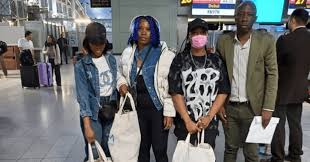By Hassan Osman Kargbo
In a significant act of international cooperation and humanitarian intervention, Sierra Leone, with the assistance of the International Organisation for Migration (IOM), has successfully repatriated three Sierra Leonean women who were left stranded at the Iran-Iraq border following a failed attempt to migrate to Europe.
The women, whose identities are being withheld for their protection, left Sierra Leone separately in 2021 and 2022, driven by dreams of a better future. Their journey took them to the Kurdistan region of Iraq, where they worked as domestic workers for two to three years. They had planned to save enough money to finance the next leg of their journey to Europe, using Turkey as a transit point.
Their hopes were dashed when an agent based in Tehran—identified only as “Hassan”—failed to show up at the Iran-Iraq border, despite promising to facilitate their travel to Europe in exchange for $2,000 each. The women said they had made prior arrangements and were told the journey would be smooth and safe.
However, upon reaching the border, they waited for days in increasingly unsafe conditions. Efforts to contact Hassan proved futile. The situation worsened when they were reportedly robbed by unknown individuals, leaving them without money, documents, or personal belongings.
“We had nothing left—not even our phones. We were completely lost,” said one of the repatriated women during a debriefing in Freetown. “We had trusted someone who disappeared, and we were left at the mercy of strangers in a foreign land.”
Local Iranian authorities eventually intervened, detaining the women for their safety and conducting background checks. After confirming their nationality, they were handed over to the Sierra Leonean Embassy in Tehran, which then contacted the IOM for urgent support.
According to the Ministry of Foreign Affairs and International Cooperation, the embassy worked swiftly in collaboration with IOM to process the necessary travel documents and facilitate the women’s safe return to Sierra Leone. The women arrived in Freetown earlier this week and are currently undergoing reintegration counselling.
“This case highlights the extreme dangers of irregular migration and the vulnerability of our citizens abroad,” said a spokesperson from the ministry. “We commend the Iranian authorities for their humane response and thank the IOM for their steadfast support in ensuring the safe return of our nationals.”
The International Organisation for Migration, which has a long-standing partnership with the Sierra Leonean government, provided financial and logistical support, including travel arrangements, medical checks, and post-arrival reintegration assistance.
“This operation underscores the importance of coordinated international efforts in addressing the challenges of irregular migration,” said IOM Sierra Leone Chief of Mission, Christa Rottensteiner. “Our goal is to ensure that migrants who find themselves in desperate situations have access to protection, dignity, and a chance to rebuild their lives.”
Back in Sierra Leone, the women are being offered psychosocial support and vocational training opportunities to help them reintegrate and build stable futures.
Authorities are also urging citizens, particularly young women, to avoid dangerous migration routes and instead seek out safe and legal opportunities for overseas work.
As the global migration crisis continues to evolve, the story of these three women stands as a stark reminder of the risks involved and the crucial role of international partnerships in protecting vulnerable migrants.













